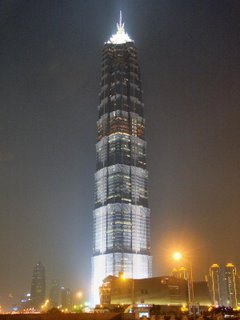Friday, April 27, 2012
Short-Changed
You probably have read in the newspaper forum recently about a reader criticizing dog owners for shirking their responsibility of taking their dogs out for some exercise. He also added that it was wrong of them to pass the responsibility to their maids.
In response to this criticism, a reader wrote that some maids, instead of exercising their dogs, strapped them to a tree in the park and used the opportunity to enjoy a chit-chat session with other maids there…
Frankly, I’m not really interested who should take the dog out regularly for a walk or what the maid should or should not do in the park. But this afternoon, I saw a maid doing something more bizarre.
On my way home, I saw a maid with an old man in a wheelchair stopping in front of my neighbour's front gate. I have seen this maid wheeling him to the park a few times before. On this occasion, instead of going to the park, the maid parked the old man in the wheelchair at my neighbour’s gate and she and my neighbour’s maid were sitting on a bench beside the gate. And what the heck were they doing there? Well, the two Indonesian maids were chatting and watching a mobile phone screen, and not paying any attention to the old man. But the maid was supposed to take him to the park to get him some fresh air!
Why did the old man keep quiet? I looked at him more closely. His mouth was half open with the lower jaw hanging down loosely. Obviously he was a stroke patient, incapable of talking and protesting. And the maid knew it!
After about 5 minutes, I came out of my house. The maids were still chit-chatting happily and the old man was still staring vacantly into space.
Dogs get bullied by maids. Old people, especially invalids, also get short-changed. Whose fault is it? What can be done?
23 January 2010
Sunday, October 31, 2010
Saturday, October 30, 2010
Tembusu Alumni - Awards, Activities & Projects
Videos -
1. Life Inspiration Awards 2002
2. To Shanghai 2002
3. Life Inspiration Awards 2004
4. To Xiamen 2004
5. To Hakka Tulou (客家土楼)
6. Xiamen - More Places to Visit
7. Tembusu Alumni (Activities & Projects) Part 1
8. Tembusu Alumni (Activities & Projects) Part 2
Saturday, January 12, 2008
Video Clips
My latest video clips posted to YouTube
1. Computer Class for the Elderly : http://www.youtube.com/watch?v=YVfIbKHvFkA
2. Retirees Lunch Group Singapore: http://www.youtube.com/watch?v=mQ2tTCzPaTI
=============================================
Wednesday, August 16, 2006
Video Clips Taken in Shanghai - April & May 2006
During my visit to Shanghai in April and May, photos and video clips were taken, showing Yu Yuan 豫园, Lujiazui 陆家嘴, Xiangyang shopping stalls (襄阳路商场), etc. Here are some of them for you viewing pleasure.
Xiangyang Mart


Yu Garden


Cafe near Regalia ----Bookshop with no door


Regalia Apartment


Lujiazui


The videos are on YouTube. To view them please click the link below:
( The downloading of the video will take some time. Please be patient.)
1. http://www.youtube.com/watch?v=LPsFISbvtmY
2. http://www.youtube.com/watch?v=SVN3PQ039JM
Xiangyang Mart


Yu Garden


Cafe near Regalia ----Bookshop with no door


Regalia Apartment


Lujiazui


The videos are on YouTube. To view them please click the link below:
( The downloading of the video will take some time. Please be patient.)
1. http://www.youtube.com/watch?v=LPsFISbvtmY
2. http://www.youtube.com/watch?v=SVN3PQ039JM
Friday, August 04, 2006
My Apartment in Shanghai
I bought a two-bedroom apartment in Lujiazui, the trade and financial district in Pudong, Shanghai.
The Regalia
 I bought it in 1994. I was one of those naive Singaporeans who thought money could be made in China's red-hot property market. We were wrong....so very wrong! Many of us ended up without even seeing a brick on the buidling site, and worse ... losing every dollar that was invested! I was one of the luckier ones who finally managed to sell off my apartment after about 12 years and get back the capital. But if I included the costs of spending months fighting for the title deed and the return of stamp fee the developer had overcharged us (about Sing $10,000), and the many problems with the developer, the management office, rental agents and tenants, then my little venture into China property market was a big mistake.
I bought it in 1994. I was one of those naive Singaporeans who thought money could be made in China's red-hot property market. We were wrong....so very wrong! Many of us ended up without even seeing a brick on the buidling site, and worse ... losing every dollar that was invested! I was one of the luckier ones who finally managed to sell off my apartment after about 12 years and get back the capital. But if I included the costs of spending months fighting for the title deed and the return of stamp fee the developer had overcharged us (about Sing $10,000), and the many problems with the developer, the management office, rental agents and tenants, then my little venture into China property market was a big mistake.When Deng Xiaoping was in charge, China opened its door wider and welcomed foreign investments. And building luxury condos and commercial buildings and selling them to foreigners was one sure way of attracting foreign funds into China. So property developers in China and Hong Kong joined forces and easily acquired lands in cities like Beijing, Shanghai and Guangzhou to build condos and commercial buildings for foreign investors. Most of these property developers from Hong Kong and China had very ambitious plans, so ambitious that they threw all cautions aside. Many did not deal only with one or two projects at one time. Without much control by the govt on land acquisition and bank loan approvals, they just went ahead with several building projects all at one go. Reason? If they could make tons of money by borrowing money easily from the banks and if there were a lot of ready buyers, especially from wealthy overseas Chinese, why not?
Singapore in the 90s was doing very well economically and its citizens were eager to invest their money in properties; but as the costs of buying properties in Singapore escalated, they looked for properties elsewhere, such as Malaysia, Australia and China. Of course, the property developers overseas could somehow smell our Singaporean money. So they came to exhibit their "wares". On weekends you could see many of them displaying their project plans and distributing glossy brochures in exhibition halls and 5-star hotels. And Singaporeans, flushed with money, came in droves to see the exhibitions. They were impressed by the project plans and the building models on display. Moreover, compared with the houses in Singapore, they were so very cheap, cheap, cheap! Of course, "kiasu" Singaporeans were afraid to lose out to others; so they came in large numbers and queued up to buy.
I remember going to one of the exhibitions at the World Trade Centre. I queued for nearly an hour, and when it was my turn to choose a unit in a mega housing project in Qingdao, China. I found to my dismay ( on hindsight I should say: fortunately) that all the good ones had already been booked, leaving only those that were either too big or small or facing the wrong directions. So I left without booking one, blaming myself for not coming earlier.
A few years later I learnt from the newspapers that the mega housing project in Qingdao was a failure. Most of the buyers did not even see a brick on the building site, and, worse still, did not get back the money they had paid as downpayment.
The Shanghai Pudong apartment I bought in 1994 was in a condominium with a grand name: The Regalia. It was being developed by Hong Kong's Golden Horse Group, which by 1994 (according to its first Newsletter published on 28.02.1995) had grossed a turnover of 5 billion in Sing dollars. We were also told by this Newsletter that the rental returns in 1994 in Shanghai were: Monthly Rent: USD 3.74 - 5.95 per sq ft, and Investment Yield (%): 18 - 23 . It also predicted that the monthly returns in the following year (1995) would be more: Monthly Rent: USD 4.18 - 6.41 per sq ft, and Investment Yield (%): 22 - 23. In other words, buyers of properties in Shanghai would be able to get back their capital in a few years' time!
After a few weeks of media blitz, the Regalia project was officially launched in Singapore on 03.06.1994. In the showroom, there were photos of The Regalia under construction, showing that it had gone up as high as the 14th level. We were also told that the project would be completed by the end of 1995. All very impressive!
I gained greater confidence in Golden Horse on learning that Guthrie GTS, a listed company of Singapore, had joint forces with the Group to build The Regalia. Besides, we also learnt that Mr Lee Khoon Choy, a respected Singaporean, was a Vice Chairman of Golden Horse Group and chairman of its Singapore branch named Golden Horse Overseas Estate Service.
Two days later, I went to the office of Golden Horse Overseas Estate Services Pte Ltd at Chinatown Point with my wife and daughter and paid a deposit of $500 to book a unit priced at US$174,000.
After the booking, all that we buyers of The Regalia had to do was to wait eagerly for the monthly progress report, pay the legal fees and installments when asked to. We paid willingly, for we were pleased that everything was according to schedule. Golden Horse even threw a party for the buyers at Amara Hotel on 27.01.2005 and called it the Shanghai Night to welcome the Lunar New Year. This party boosted our confidence that Golden Horse was doing well and that we would be able to take possession of our apartments in early 1996.

My first trip to Shanghai to see Regalia for the first time was in March 1996. Three representatives of Golden Horse were at the airport to receive me and another buyer. The next day we took a taxi from our hotel to The Regalia. We were however not very impressed by the building because it was not as grand as the building shown in the brochure. Neither were we happy with the fittings in the apartments as there were tiny cracks in the main door, the parquet flooring was poorly polished and the cables of the air-conditioners were glaringly exposed. Further inspection of the building revealed that the common area facilities such as the basement carpark, the covered swimming pool, the karaoke lounge and the gym were still under construction! How could we rent out our units when these facilities were not ready? And the management insisted that we owners had to pay the monthly maintenance fee of RMB610.00 (about S$110) even when these common facilities were not ready!
We had suspected for some time that Golden Horse was in financial trouble soon after the lunar new year party. The banks in China had stopped lending money on easy terms to property developers because they had already built too many condos. With the source of money drying up, these developers with several mega projects half completed could hardly carry on. Unfortunately for the buyers of Regalia, only about three quarters the project had been completed. That was why the developer had to cut costs by reducing the work force and using poor-quality materials, 偷工减料! We were really disappointed because we thought we had a good bargain.
You really have to believe the saying: Man proposes, God disposes. 谋事在人,成事在天。
Quietly Golden Horse branch office in Singapore closed down some time in the later part of 1997 or early 1998. Those of us who had paid for our properties with cash demanded that we be given the title deed. We were told that we had to ask the main officce in Shanghai to attend to any of our demands. We were very worried.
Another complaint of ours was that we had already paid the 6% stamp fee to the developer for prosessing the title deed. But when the govt had later reduced it to 3%, the developer took no action to refund us the extra 3% it had received from us. The excuse given was that they were short of monay and would try to refund us later. They were now playing "Taiji", an art of gently parrying with opponents.
Meanwhile I also faced the problem of finding a tenant for my apartment. And the sooner I got one the better because, whether my apartment was occupied or not, I had to pay the monthly maintenance fee of RMB610 (about 120 Sing dollars).
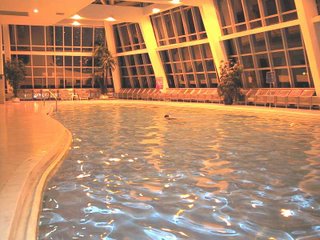
Regalia's Indoor Swimming Pool
The big Sitting Room
It was not until one year later (1997) that the facilities in the common areas, such as the swimming pool, the tennis court and the carpark, had been completed. With the completion, I managed to get a tenant through a rental agency. This first tenant of mine was a Korean businessman running a Korean restaurant in Pudong, Shanghai. The monthly rental was USD1,200. The first monthly rental I received went to the rental agency as commission; and the second and third were used to pay for furnishing the apartment. Thus not until the 4th month was the rental money credited into my bank account.
Meanwhile, I continued to press the developer for my apartment title deed and the refund of the extra 3% stamp fee by regularly phoning its main office in Shanghai and sending registered letters to its boss. At last, after a few months of persistent phone calls and letters, I received a fax message from the main office that the title deed was ready and that I should go to Shanghai to collect it. I flew to Shanghai the following week and received the important document, which legally acknowledged me and my second daughter as joint owners of the apartment. But the developer refused to refund me the 3% stamp fee.
I was quite relieved that I had got the title deed. But many Singaporean buyers were still waiting patiently, trusting that the developer would one day get the title deed for them.
Soon after I had got back from Shanghai, one Mr Lim (who had two Regalia apartments) somehow managed to get from Regalia Management Office a list of Singaporean buyers (and their tel numbers) many of whom had yet to receive the title deed. He wanted to inform these owners to quickly go to Shanghai to press the developer for the document. As he could not speak English, he approached me for help to inform these owners. I agreed and spent nearly two days trying to contact these owners. I managed to contact about 70% of them. Then a few days later, we received another bad news from Regalia Management Office: 13 apartments bought by Singaporeans would soon be auctioned off. You see, ownership of these apartments had not been transferred to the buyers. So the developer could easily mortgage them to a financial company to get a loan. And in the event that the developer defaulted, the loan company could auction off these properties to recover the loan.
To help these owners ( about 30 of them) who had yet to get their titles and those whose properties would soon be auctioned off, we invited all Singaporean owners of The regalia to meet at the conference room in a community club to try to find ways and means of tackling the problems. We met several times, during which we even attempted to form the owners association. But this is another story....
Now let me go back to the story about my apartment. Just as I was getting some returns for my investment in China, the Asian Financial Crisis came like a bombshell. Businesses in China were of course badly affected. My Korean tenant's restuarant closed down and he and his family returned to Korean. The next tenant was a Greek in ship buildidng industry. The rental was reduced to USD600.
From 1999 to 2005, the rental money I received varied from S$800 to 1,000 per month. And when the apartment was vacant I would take the opportunity to visit Shanghai with my family or friends and stay at my apartment for one to two weeks. The stay was always a pleasant one as the metro station was not far away from Regalia, and there were a supermarket, restaurants and shops s stone's throw away. Besides, to us Singaporeans, Shanghai is a shopping paradise and we enjoyed shopping at places such as Nanjing Lu Pedestrian Mall and Yu Gardens.

The Asian financial crisis and the glut of houses in Shanghai caused the property market to be in the doldrums for a number of years. Then it turned around, albeit slowly at first, but the pace quickened noticeably from 2004 onwards.
I had since early 2004 made up my mind to sell the apartment. Why? Because we owners had no control over the management of the Regalia. Rediculous, but true! And as we lived far away from Shanghai, we always had endless problems dealing with untrustworthy rental agents and tenants who were often not punctual in paying rent. I asked myself: Why should I in my twilight years be burdened with these problems?
Since the beginning of last year (2005), property prices of apartments like mine had gone up unbelievingly high. And I had numerous phone calls from property agents telling me that there were ready buyers willing to pay as high as RMB13,500 psm for my apartment. This was the highest price offered after the financial crash. But I had no confidence in these Shanghainese agents who were strangers to me; and despite the warning that the property bubble would soon burst, I thought I should go to Shanghai to find out for myself the true market situation. So, my wife and I flew to Shanghai in the middle of April. But a few days before we left for Shanghai, the bubble burst: the central govt of China had, with immediate effect, imposed much greater restrictions on bank loans and property tranactions to stop rampant speculation. The new rules effectively brought down the prices by 20-30 %. When I arrived in Shanghai, I was asked if I would sell at RMB12,000 psm, I refused and asked for 12,500. But by then many buyers had disappeared. They were now waiting for the prices to go down some more. So I came back without making a sale.
Now the speculators holding one or more properties were in dire straits. Many had bought when the price was at its peak. Those who could not sevice the bank loans had to sell cheaply, some even at below RMB10,000.
The big Sitting Room
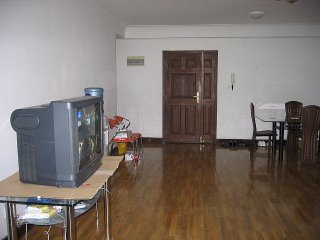
It was not until one year later (1997) that the facilities in the common areas, such as the swimming pool, the tennis court and the carpark, had been completed. With the completion, I managed to get a tenant through a rental agency. This first tenant of mine was a Korean businessman running a Korean restaurant in Pudong, Shanghai. The monthly rental was USD1,200. The first monthly rental I received went to the rental agency as commission; and the second and third were used to pay for furnishing the apartment. Thus not until the 4th month was the rental money credited into my bank account.
Meanwhile, I continued to press the developer for my apartment title deed and the refund of the extra 3% stamp fee by regularly phoning its main office in Shanghai and sending registered letters to its boss. At last, after a few months of persistent phone calls and letters, I received a fax message from the main office that the title deed was ready and that I should go to Shanghai to collect it. I flew to Shanghai the following week and received the important document, which legally acknowledged me and my second daughter as joint owners of the apartment. But the developer refused to refund me the 3% stamp fee.
I was quite relieved that I had got the title deed. But many Singaporean buyers were still waiting patiently, trusting that the developer would one day get the title deed for them.
Soon after I had got back from Shanghai, one Mr Lim (who had two Regalia apartments) somehow managed to get from Regalia Management Office a list of Singaporean buyers (and their tel numbers) many of whom had yet to receive the title deed. He wanted to inform these owners to quickly go to Shanghai to press the developer for the document. As he could not speak English, he approached me for help to inform these owners. I agreed and spent nearly two days trying to contact these owners. I managed to contact about 70% of them. Then a few days later, we received another bad news from Regalia Management Office: 13 apartments bought by Singaporeans would soon be auctioned off. You see, ownership of these apartments had not been transferred to the buyers. So the developer could easily mortgage them to a financial company to get a loan. And in the event that the developer defaulted, the loan company could auction off these properties to recover the loan.
To help these owners ( about 30 of them) who had yet to get their titles and those whose properties would soon be auctioned off, we invited all Singaporean owners of The regalia to meet at the conference room in a community club to try to find ways and means of tackling the problems. We met several times, during which we even attempted to form the owners association. But this is another story....
Now let me go back to the story about my apartment. Just as I was getting some returns for my investment in China, the Asian Financial Crisis came like a bombshell. Businesses in China were of course badly affected. My Korean tenant's restuarant closed down and he and his family returned to Korean. The next tenant was a Greek in ship buildidng industry. The rental was reduced to USD600.
From 1999 to 2005, the rental money I received varied from S$800 to 1,000 per month. And when the apartment was vacant I would take the opportunity to visit Shanghai with my family or friends and stay at my apartment for one to two weeks. The stay was always a pleasant one as the metro station was not far away from Regalia, and there were a supermarket, restaurants and shops s stone's throw away. Besides, to us Singaporeans, Shanghai is a shopping paradise and we enjoyed shopping at places such as Nanjing Lu Pedestrian Mall and Yu Gardens.

The Asian financial crisis and the glut of houses in Shanghai caused the property market to be in the doldrums for a number of years. Then it turned around, albeit slowly at first, but the pace quickened noticeably from 2004 onwards.
I had since early 2004 made up my mind to sell the apartment. Why? Because we owners had no control over the management of the Regalia. Rediculous, but true! And as we lived far away from Shanghai, we always had endless problems dealing with untrustworthy rental agents and tenants who were often not punctual in paying rent. I asked myself: Why should I in my twilight years be burdened with these problems?
Since the beginning of last year (2005), property prices of apartments like mine had gone up unbelievingly high. And I had numerous phone calls from property agents telling me that there were ready buyers willing to pay as high as RMB13,500 psm for my apartment. This was the highest price offered after the financial crash. But I had no confidence in these Shanghainese agents who were strangers to me; and despite the warning that the property bubble would soon burst, I thought I should go to Shanghai to find out for myself the true market situation. So, my wife and I flew to Shanghai in the middle of April. But a few days before we left for Shanghai, the bubble burst: the central govt of China had, with immediate effect, imposed much greater restrictions on bank loans and property tranactions to stop rampant speculation. The new rules effectively brought down the prices by 20-30 %. When I arrived in Shanghai, I was asked if I would sell at RMB12,000 psm, I refused and asked for 12,500. But by then many buyers had disappeared. They were now waiting for the prices to go down some more. So I came back without making a sale.
Now the speculators holding one or more properties were in dire straits. Many had bought when the price was at its peak. Those who could not sevice the bank loans had to sell cheaply, some even at below RMB10,000.
The big Sitting Room

The small kitchen
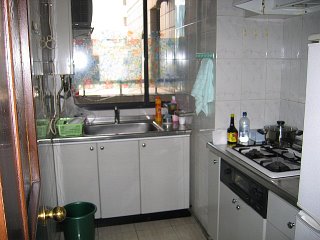
What comes down is always at a faster speed than what goes up! True or not?
I think it is true especially in the property market in Shanghai: it took just one day for the property price to tumble 10-20% but a year or so to move up 10 %.
Towards the end of 2005, the price inched up from 10,000 to 11,000 psm. I told my property agent to let me know when it reached 11,500. Then in early April this year he informed me that there was a prospective buyer who would pay cash if I would sell it for 11,300. Tired of holding on to a property that had been without a tenant for a year and fed up with paying the monthly maintenance fee of RMB 610, I gave in and accepted the offer.
Worried that in a foreign country I might be deceived or fleeced by the property agency, I thought I should engage somebody to assist me in going through the transactions and to give me legal advice, I contacted through my daughter-in-law a Singaporean working in Shanghai and asked for his advice. He in turn introduced me to a Shanghainese lady who had worked as a property consultant. I contacted her and found her to be pleasant and very knowledgeable in matters pertaining property transactions; and she was willing to take two days off so as to accompany me during the notarization of documents and the final transaction at the Land Office. I told her I would pay her RMB2,000 for her services. ( In fact I paid her RMB500 more as tip for giving me very satisfactory service.)
My wife and I arrived in Shanghai in the last week of April and stayed at our apartment. The next morning I met this Shanghainese lady, Ms He, and together we went to the property agent's office. The Notary Republic came, checked and certified all the relevant documents. The title deed was then handed over to the agency for safekeeping. When the notary republic had left, we proceeded to the buyer's bank. There I opened a savings account. Within a few minutes, the buyer transferred the 10% deposit into my account.
We were not able to complete the final transaction in the following week because of China's special public holiday week known as Golden Week from May 1 to 7 , during which all the government offices were closed. So the final property transfer had to be done after the holiday, on 10.05.2006.
Thus my wife and I had a week of free time. On May 5, Andrew and Veron (my son and daughter-in- law) came from Singapore to join us. Together we went shopping and visited places of interest such as Jin Mao Tower, the tallest building in China, and Xiangyang Lu shopping mart, well-known for its imitation branded goods.
On the morning of May 10, we went to the land office in Pudong. The office was very crowded with buyers, sellers and property agents milling around, more than 100 of them. There were long queues at every counter. My assistant Ms He and the 3 property agents accopanying us were not at all flustered by the crowd and the noise as they had been there many times before. They moved from one counter to another without any problem; and all that the buyer and I had to do was to sign documents and pay whatever fees they asked us to pay. And believe me or not, the final transfer of the property was done within one hour! To me from Singapore, the office was too small to accommodate so many people, but somehow they got the transactions done efficiently and quickly.
Then the buyer gave us a lunch treat at a restaurant before going with us to his bank to transfer the balance of the money ( 90%) from his account into mine. And the transfer was done in just one hour. The next thing to do at the bank was to transfer the 2% commission from my account into the agent's account. There were no hitches and everything was done in a jiffy.
The next morning, I went to this local bank and transferred all my money into my savings account with our Singapore's DBS branch in Pudong. With all the money in my DBS account, I felt vey relieved, and that night I slept soundly.
My little venture into China's property market has come to a happy ending. Thank God for that. I did not get my fingers burnt, but neither did I make any profit. Later, I managed to transfer all my money back to Singapore.
On hindsight, I shouldn't have bought the property in China. It had given me many sleepless nights. Is it wise to venture into China again? Yes, if you are young and have millions of dollars for investment, and if you have trustworthy lawyers and advisors to assist you. No, definitely Not if you are like me with only some savings for old age, for it will only bring you endless trouble. You see, as law-abiding Singporeans, we are no match for these xxxx developers based in China or Hong Kong.
那一座是东方明珠塔?
Saturday, January 07, 2006
Visiting Tu Lou - Hakka's Earth Buildings
A group of us, consisting of 20 High Five Youth awardees, 10 Life Inspiration Award winners and 7 officials from Central Singapore CDC, went to the city of Xiamen ( 厦门 ), China on an exchange programme in June 2004. I went with them as one of the officials.
@ S'pore Consulate... Meeting Deputy Mayor
With S'pore Club M'bers
Besides visiting Singapore's Consulate in Xiamen, community centres, an
orphanage, a home for the elderly, YMCA, the University for the Elderly (老人大学) and some 3-generation families, we also visited the inimitable Hakka Tu Lou (客家土楼) in Yongding County ( 永定县). Tulou is a Chinese name meaning Earth Building.
The bus journey from the city of Xiamen to the earth buildings in Yongding County took about 5 hours. Travelling along the fertile plains of south Fujian (福建), we saw endless stretches of vegetable and fruit farms, dotted with well-built wooden and brick houses. But as we entered the mountainous region of Yongding, the farms gave way to rugged and rocky terrains, and the roads were narrow and winding.
During the long bus ride, the local tour guide entertained us with interesting stories about the province of Fujian, particularly about the wars over Taiwan, the conflicts and intrigues among the warlords towards the end of Manchu Dynasty. We were also fascinated by his narration of how the Hakkas (客家人), as early as 1,000 years ago, due to wars and persecutions, started to migrate from the central regions of China to Fujian and Guandong (广东) in the south. As poor migrants they had to work extremely hard to survive and build their new homes. Life was hard for them because the good and fertile plains had already been occupied by the locals who of course resented their intrusion. Being unwelcome, they had no alternative but to move into the mountains. To survive, they banded together and devised ways to defend and protect themselves. The earth buildings were therefore designed not for aesthetic reasons, but for protection from the elements, and for defence against wild animals, thieves and bandits
migrants they had to work extremely hard to survive and build their new homes. Life was hard for them because the good and fertile plains had already been occupied by the locals who of course resented their intrusion. Being unwelcome, they had no alternative but to move into the mountains. To survive, they banded together and devised ways to defend and protect themselves. The earth buildings were therefore designed not for aesthetic reasons, but for protection from the elements, and for defence against wild animals, thieves and bandits
The tour guide also told us that some years ago, some American satellite photos picked up the pictures of these Hakka Tulous and thought that they were China's nuclear reactors hidden in the mountainous regions of Fujian. Greatly alarmed, some US military liaison officers stationed at the American Embassy in Beijing were sent down to Yongding to investigate. They found to their relief and embarrassment that what they thought were nuclear reactors or missile silos were in fact harmless earth buildings where the Hakkas had been living for centuries!
pictures of these Hakka Tulous and thought that they were China's nuclear reactors hidden in the mountainous regions of Fujian. Greatly alarmed, some US military liaison officers stationed at the American Embassy in Beijing were sent down to Yongding to investigate. They found to their relief and embarrassment that what they thought were nuclear reactors or missile silos were in fact harmless earth buildings where the Hakkas had been living for centuries!
Since the discovery of the earth buildings by the American satellite, word of these unique buildings began to spread far and wide, resulting in thousands of tourists from all over the world coming to Fujian to take a look at the buildings, particularly the Japanese tourists.
 We arrived at our destination: Zhencheng Lou (振成楼) at about 3.00pm. I was given a small room on the top (4th) floor with a wooden bed. Furnishings were less than basic: a very thin mattress, a blanket, a pillow and a stool. There were no tables, mirror or wardrobe, and water can only be
We arrived at our destination: Zhencheng Lou (振成楼) at about 3.00pm. I was given a small room on the top (4th) floor with a wooden bed. Furnishings were less than basic: a very thin mattress, a blanket, a pillow and a stool. There were no tables, mirror or wardrobe, and water can only be found on the ground floor. I found a small plastic pail in a corner and later I was told that it was meant for me to use at night so that I need not have to go down all the way from the fourth level to the first level, open the big door and grope my way to the toilets located a distance away.
found on the ground floor. I found a small plastic pail in a corner and later I was told that it was meant for me to use at night so that I need not have to go down all the way from the fourth level to the first level, open the big door and grope my way to the toilets located a distance away.
I did not have a bath that day except to clean myself with a pail of well water and a face towel. Some who wanted to have a bath had to queue up for their turn outside the bathroom ( there was only one decent one). In the bathroom, they had to wait a long time to fill up your small wooden tub with water!. Was there hot water for bathing? Hot water? You must be joking!
 The owner of this Tulou doubled as our tour guide. He gave us a short
The owner of this Tulou doubled as our tour guide. He gave us a short  description of his Earth Building named Zhencheng Lou. It was built in 1912 by a rich Hakka for his clan. The walls of the Tulou were made impregnable with rammed earth and sandstone mixed with bamboo, brown sugar and sticky rice. Each wall is 1 metre thick and about 18 metres tall. There is only one door and the windows are small and found only on the higher floors. Most of the Tulous are round, square or rectangular.
description of his Earth Building named Zhencheng Lou. It was built in 1912 by a rich Hakka for his clan. The walls of the Tulou were made impregnable with rammed earth and sandstone mixed with bamboo, brown sugar and sticky rice. Each wall is 1 metre thick and about 18 metres tall. There is only one door and the windows are small and found only on the higher floors. Most of the Tulous are round, square or rectangular.
During the long bus ride, the local tour guide entertained us with interesting stories about the province of Fujian, particularly about the wars over Taiwan, the conflicts and intrigues among the warlords towards the end of Manchu Dynasty. We were also fascinated by his narration of how the Hakkas (客家人), as early as 1,000 years ago, due to wars and persecutions, started to migrate from the central regions of China to Fujian and Guandong (广东) in the south. As poor
 migrants they had to work extremely hard to survive and build their new homes. Life was hard for them because the good and fertile plains had already been occupied by the locals who of course resented their intrusion. Being unwelcome, they had no alternative but to move into the mountains. To survive, they banded together and devised ways to defend and protect themselves. The earth buildings were therefore designed not for aesthetic reasons, but for protection from the elements, and for defence against wild animals, thieves and bandits
migrants they had to work extremely hard to survive and build their new homes. Life was hard for them because the good and fertile plains had already been occupied by the locals who of course resented their intrusion. Being unwelcome, they had no alternative but to move into the mountains. To survive, they banded together and devised ways to defend and protect themselves. The earth buildings were therefore designed not for aesthetic reasons, but for protection from the elements, and for defence against wild animals, thieves and banditsThe tour guide also told us that some years ago, some American satellite photos picked up the
 pictures of these Hakka Tulous and thought that they were China's nuclear reactors hidden in the mountainous regions of Fujian. Greatly alarmed, some US military liaison officers stationed at the American Embassy in Beijing were sent down to Yongding to investigate. They found to their relief and embarrassment that what they thought were nuclear reactors or missile silos were in fact harmless earth buildings where the Hakkas had been living for centuries!
pictures of these Hakka Tulous and thought that they were China's nuclear reactors hidden in the mountainous regions of Fujian. Greatly alarmed, some US military liaison officers stationed at the American Embassy in Beijing were sent down to Yongding to investigate. They found to their relief and embarrassment that what they thought were nuclear reactors or missile silos were in fact harmless earth buildings where the Hakkas had been living for centuries!Since the discovery of the earth buildings by the American satellite, word of these unique buildings began to spread far and wide, resulting in thousands of tourists from all over the world coming to Fujian to take a look at the buildings, particularly the Japanese tourists.
 We arrived at our destination: Zhencheng Lou (振成楼) at about 3.00pm. I was given a small room on the top (4th) floor with a wooden bed. Furnishings were less than basic: a very thin mattress, a blanket, a pillow and a stool. There were no tables, mirror or wardrobe, and water can only be
We arrived at our destination: Zhencheng Lou (振成楼) at about 3.00pm. I was given a small room on the top (4th) floor with a wooden bed. Furnishings were less than basic: a very thin mattress, a blanket, a pillow and a stool. There were no tables, mirror or wardrobe, and water can only be found on the ground floor. I found a small plastic pail in a corner and later I was told that it was meant for me to use at night so that I need not have to go down all the way from the fourth level to the first level, open the big door and grope my way to the toilets located a distance away.
found on the ground floor. I found a small plastic pail in a corner and later I was told that it was meant for me to use at night so that I need not have to go down all the way from the fourth level to the first level, open the big door and grope my way to the toilets located a distance away.I did not have a bath that day except to clean myself with a pail of well water and a face towel. Some who wanted to have a bath had to queue up for their turn outside the bathroom ( there was only one decent one). In the bathroom, they had to wait a long time to fill up your small wooden tub with water!. Was there hot water for bathing? Hot water? You must be joking!
 The owner of this Tulou doubled as our tour guide. He gave us a short
The owner of this Tulou doubled as our tour guide. He gave us a short  description of his Earth Building named Zhencheng Lou. It was built in 1912 by a rich Hakka for his clan. The walls of the Tulou were made impregnable with rammed earth and sandstone mixed with bamboo, brown sugar and sticky rice. Each wall is 1 metre thick and about 18 metres tall. There is only one door and the windows are small and found only on the higher floors. Most of the Tulous are round, square or rectangular.
description of his Earth Building named Zhencheng Lou. It was built in 1912 by a rich Hakka for his clan. The walls of the Tulou were made impregnable with rammed earth and sandstone mixed with bamboo, brown sugar and sticky rice. Each wall is 1 metre thick and about 18 metres tall. There is only one door and the windows are small and found only on the higher floors. Most of the Tulous are round, square or rectangular. 



The big ones are as large as a football field and can accommodate more than 600 people. The bedrooms are at the 3rd and 4th levels while the second level is a granary. The first level is for communal activities such as cooking, dining, washing, meetings, ancestor worship, games, rearing fowls, goats and pigs.
While on the ground floor chit-chatting with the residents, I saw some chickens wandering in the open space looking for scraps of food. I did not find any pigs. The residents had either kept them out of sight or stopped rearing them.
I also noticed that the residents were either old or very young.
"Where are those in between the age groups?" I asked the Tulou owner.
He told me that there were no job opportunities in the village, so the young ones had to find work in the city. Most of the married ones leave their children behind for their parents to take care of.
After dinner our tour bus took us to Zhongchuan Cun (中 川 村), a Hakka village, to meet the residents there for a get-together. We were warmly received with firecrackers and by a village brass band and a women's band of Chinese flutes and cymbals. There were speeches, more band performances, singing and dancing. The highlight was a fashion show staged by us from Singapore. The grand finale of the show was the singing in unison of our favourite song: The Moon Represents My Heart ( 月亮代表我的心) by the village children and us the visitors.



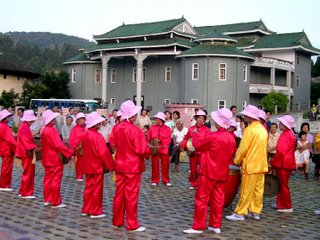



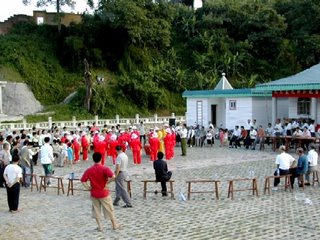

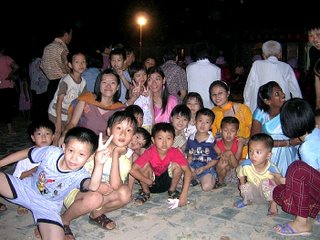
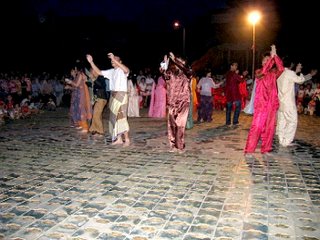
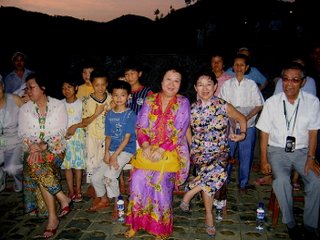
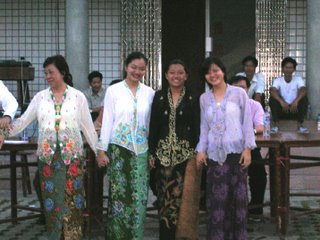


We returned to our "Tulou Hotel" at about 9.30pm. Most of us elderly members retired to our rooms early. As the young ones were still full of energy, the place was not quiet until well after midnight.
My room was hot and stuffy but as I used to sleep on planks without mattress in my younger days, I managed to sleep well. I was tired anyway.
I was awakened early in the morning by roosters crowing and thrushes singing lustily. I enjoyed listening to these birds breaking the morning silence.. They reminded me of the two years on a vegetable farm during the Japanese Occupation.
After breakfast, we went to Zhongchuan Village again. Besides visiting Aw Boon Haw ( Tiger Balm King) Memorial Hall, we also visited homes of some local residents to learn first hand how they lived their lives in such a mountainous region so far away from the city.
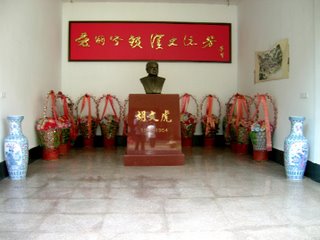



We left the Hakka village for Xiamen after lunch and arrived in the city at about 7.00pm.


I think the Tulou experience is good for our youths. On hindsight, however, I think the organisers should have given us seniors better accommodation. Why? Well, we had already gone through a lot of rough-and- tough life experiences. Do you still need to train oldsters like us to become tougher? Besides, most of us were already in our 60s and 70s, the oldest 76. And those with painful knees (osteoarthritis) found climbing up and down two or three flights of steep wooden staircase a torture. I think the organisers had only the youths in mind most of the time when planning the trip. The idea was to toughen up these future leaders. But they forgot that the awardees of the Life Inspiration Award were senior citizens, some of whom in their 70s and having knee problems. They were given the award because of their outstanding community service. So was it necessary that they should also be toughened up?
It is easier to organise group activities for either the young or the old, but much harder for both the young as well as the old.
Note: Videos showing our visits to Xiamen and Hakka Tulou are available.
To view them, please click the links below:
1. To Xiamen
2. To Hakka Tulou 客家土楼
3. Xiamen - More Places to Visit


